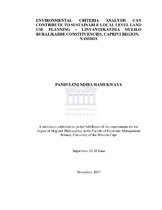| dc.contributor.advisor | Hara, M. | |
| dc.contributor.author | Hamukwaya, Panduleni Ndiba | |
| dc.contributor.other | | |
| dc.contributor.other | Faculty of Economics and Management Sciences | |
| dc.date.accessioned | 2013-10-24T08:55:48Z | |
| dc.date.available | 2009/10/20 16:17 | |
| dc.date.available | 2009/10/20 | |
| dc.date.available | 2013-10-24T08:55:48Z | |
| dc.date.issued | 2007 | |
| dc.identifier.uri | http://hdl.handle.net/11394/2317 | |
| dc.description | Magister Philosophiae - MPhil | en_US |
| dc.description.abstract | The contribution of local knowledge to land use planning and sustainable utilization of natural resources is enormous, yet often overlooked by conventional top-down approaches of regional integrated land use plans. The rich knowledge of local land users contribution to implementation of top-down plans is very important. This study investigated the importance of environmental criteria analysis in sustainable land management through engaging the community at local level, using Salambala Conservancy in Katima Mulilo Rural, Lusese Village in Kabbe and Mayuni Conservancy in Linyanti constituencies, Caprivi region, North East Namibia as case studies. | en_US |
| dc.language.iso | en | en_US |
| dc.publisher | University of the Western Cape | en_US |
| dc.subject | Land use | en_US |
| dc.subject | Rural | en_US |
| dc.subject | Environmental aspects | en_US |
| dc.subject | Namibia | en_US |
| dc.subject | Sustainable development | en_US |
| dc.subject | History | en_US |
| dc.subject | Planning | en_US |
| dc.subject | Social conditions | en_US |
| dc.title | Environmental criteria analysis can contribute to sustainable local level land use planning: Linyanti/Katima Mulilo Rural/Kabbe constituencies, Caprivi Region, Namibia | en_US |
| dc.type | Thesis | en_US |
| dc.rights.holder | University of the Western Cape | en_US |
| dc.description.country | South Africa | |

